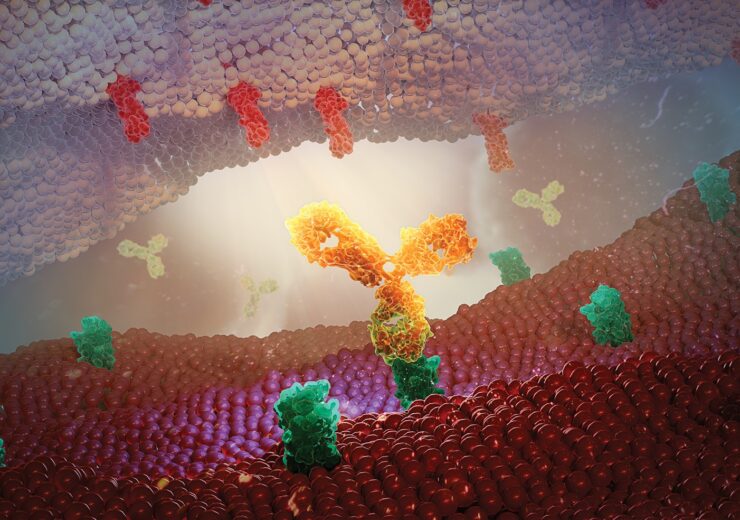According to an interim analysis of the trial, the patients treated with Enhertu showed a confirmed ORR of 37.1% and the patients with the highest level of HER2 expression showed a confirmed ORR of 61.3%

An image of functioning oncology antibody. (Credit: AstraZeneca)
AstraZeneca and Daiichi Sankyo’s Enhertu (trastuzumab deruxtecan) showed clinically meaningful and durable responses in a broad range of HER2-expressing advanced solid tumours in previously treated patients in the ongoing DESTINY-PanTumor02 Phase 2 trial.
Enhertu is a specifically engineered HER2-directed antibody-drug conjugate (ADC). It is being jointly developed and commercialised by AstraZeneca and Japan-based Daiichi Sankyo.
According to an interim analysis of the trial, patients treated with Enhertu showed a confirmed objective response rate (ORR) of 37.1%.
In patients with the highest level of HER2 expression, ADC demonstrated a confirmed ORR of 61.3%.
Additionally, a complete response (CR) was observed in 5.6% of patients, with 31.5% partial responses (PR) observed, and 46.1% of patients achieving stable disease. The disease control rate (DCR) was found at 68.2%.
AstraZeneca Oncology chief development officer and chief medical officer Cristian Massacesi said: “While HER2 is an established biomarker in breast, gastric, lung and colorectal cancers, data from the DESTINY-PanTumor02 trial validate HER2 as an actionable biomarker across a broad range of tumour types.
“Enhertu is the first treatment to demonstrate broad activity across HER2-expressing solid tumours where there are currently no approved HER2-directed therapies.
“These data will support our ongoing conversations with global health authorities as we look to bring Enhertu to as many patients as possible.”
The global, multicentre, multi-cohort DESTINY-PanTumor02 trial enrolled 267 patients at multiple sites in Asia, Europe and North America.
UK-based AstraZeneca said that the primary efficacy endpoint was confirmed ORR as assessed by the investigator. The secondary endpoints were duration of response (DoR), DCR, progression-free survival (PFS), OS, safety, tolerability, and pharmacokinetics.
In a separate development, AstraZeneca and Daiichi Sankyo’s datopotamab deruxtecan plus pembrolizumab with or without platinum chemotherapy showed ORR of 57% and 50%, respectively in the TROPION-Lung02 Phase 1b trial.
Additionally, the UK-based pharmaceutical major announced its decision to stop the Andexxa (andexanet alfa) Phase 4 trial early as it achieved pre-specified criteria on haemostatic efficacy versus usual care.
ANNEXA-1, a post-marketing trial, was evaluating the efficacy and safety of Andexxa in patients on oral FXa-inhibitor treatment including apixaban and rivaroxaban experiencing an intracranial haemorrhage.
